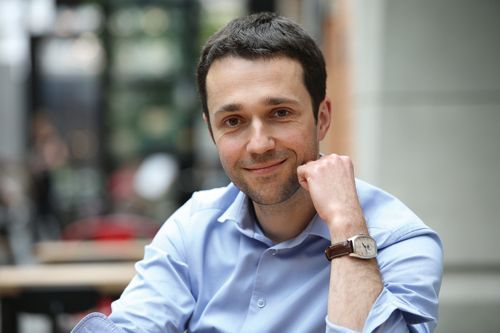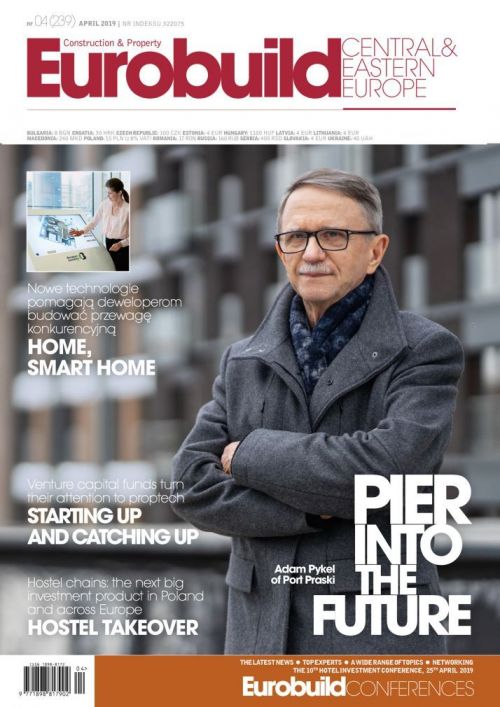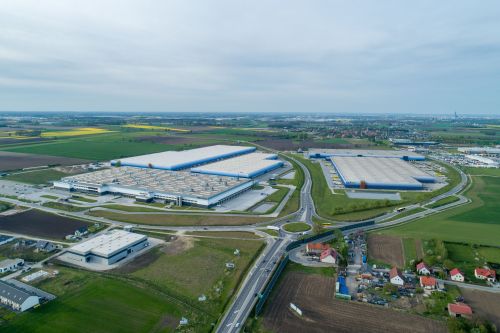Starting up and catching up
Investment & finance
Today, it is difficult to imagine what the hotel market was like before Booking.com. Few people know that one of the largest e-commerce companies in the world was once a small Dutch start-up. The origins of WeWork were equally modest. The company started its operations in New York during the financial crisis, but today it is a global firm in which Japanese conglomerate Softbank has recently invested almost USD 4.4 bln. Polish start-ups, including those in the real estate sector, have yet to achieve such spectacular success, which does not mean that they are not trying. For example, Eobuwie.pl has grown to become the leading online shoe retailer in Central Europe.
Funds also believe in the success of innovative start-ups and are investing increasingly more in them. Such investment, however, involves the kind of risks that is in no way equivalent to the security of a bank deposit. According to KPMG's ‘Venture Pulse Q1 2018’ report, Germany and the UK account for 50 pct of the European funds invested into innovative start-ups. Investment volumes in start-ups have also recently risen in France and Spain. In Poland this market is currently at an early stage of development and business here is not yet being targeted by the largest European funds. However, this could change because there are a growing number of interesting projects, especially when it comes to e-commerce and mobile apps.
Booking for offices
Any prospect of proptech revolutionising the Polish real estate market has yet to emerge. Meanwhile, in Europe a genuine revolution in the commercial real estate market should be expected from Hubble. The company is creating the world's largest online platform for leasing flexible office space, which could do for this sector what Booking.com has done for hotels. The company has already raised GBP 4 mln [app. EUR 4.6 mln] from real estate investors, headed by the JLL Spark Global Venture Fund and it is also the fund’s first European investment. “We continue to see an increase in demand for flexible office space and Hubble’s technology platform is doing a great job in streamlining the process of connecting a wide array of businesses with the right space for them,” comments Mihir Shah, the co-CEO of JLL Spark. “Hubble provides information on flexible work space and increases the transparency on the market. It also speeds up the process of office selection, which in today's rapidly changing world is itself of value. The platform is currently limited to London and Manchester, but its extension to other cities and countries is only a matter of time,” claims Adam Lis, the flexible office solutions manager at JLL Poland
The importance of the team
Another idea whose time might have come to make its presence known on foreign markets is the Tylko app, which Polish-Israeli venture capital fund TDJ Pitango Ventures has invested PLN 15 mln in. The Tylko app allows you to create and order personalised furniture from your smartphone or tablet. TDJ Pitango Ventures believes that the app is a breakthrough on a market that is currently worth USD 330 bln a year and that it could soon become one of the leading e-commerce brands in its segment in the world. “We chose several areas to specialise in. These include artificial intelligence and machine learning, big data, IoT and software as a service. We can draw a great deal from the experience of our Israeli partners. What gives a start-up its quality is, for us, first of all its team as well having as a powerful and unique technological system. It is not just about breakthrough ideas. What is key is that a given innovation cannot be quickly and cheaply copied. We believe that the key to success lies in having a harmonious, determined and competent team. We prefer having a strong team, even over technological innovation – and not the other way round,” insists Wojciech Fedorowicz, the managing partner of TDJ Pitango Ventures. In his opinion, for a start-up to be successful it must have the potential to expand globally. “We have the competence to make this assessment. TDJ Pitango Ventures was set up by Polish-based family investment company TDJ and Pitango VC – the largest venture capital fund in Israel for companies requiring early stage investment. This combination allows us to use our knowledge of building companies on the TDJ side and the global network of Pitango. We carefully analyse the market the start-up operates on. It must be large or growing rapidly, but above all it has to be global. We are looking for start-ups on markets that provide the best chance of a successful exit from the investment,” adds Wojciech Fedorowicz.
Making life easier for everyone
Collectomate’s idea is just as innovative as the Tylko app. The Łódź-based start-up was formed by Marcin Ciącio and Rafał Dylewski, aimed at improving the last-mile delivery of parcels. As a result, the company set up a network of lockers, which were placed in building reception areas and can be opened using the Collectomate app. The system can be used by couriers and private individuals and already there are Collectomate lockers in such locations as the Spark building in Warsaw and Skanska’s Campus 6 development in Bucharest. Venture capitalists Kogito Ventures and Younick Mint decided to invest PLN 1.4 mln in the start-up. “We have invested in Collectomate.io, whose system combines a mobile app available to every user with a Collectomate. The whole thing is an open system, which means that a courier, who could be from basically any logistics operator can place a parcel in the Collectomate. Moreover every app-user can assign a parcel to someone else using a peer-to-peer system, which means can leave a parcel for someone from another company to be picked up at a convenient time. Some of our customers are also using Collectomates to circulate important documents. We believe that we are supporting a project that will make life and work easier for everyone on the market – couriers, property managers and regular users who are increasingly ordering goods on-line,” claims Łukasz Obuchowicz, a partner at Kogito Ventures. The funds obtained by the Łódź-based start-up have been designated to further develop the platform so that they can work more with developers and logistic operators as well as build more Collectomate units.

“The key is not just the idea but also finding a solution to a genuine problem on the market,” argues Maciej Wieloch, the CEO of Akcelerator Innowacji NOT and the Infini fund
Good times for proptech
Technology is entering all sectors of the real estate market, which until now has been seen as one of the more traditional sectors of the economy, but why is technology coming to the market now? “No sector operates in a vacuum,” says Łukasz Obuchowicz and adds, “Real estate is used by people whose habits have changed a lot in the way they search for, buy, lease, manage, use and pay for things. They have gone digital. The buildings have also become more intelligent and are packed with electronics much more than they were a few years ago.” Over the last five years, venture capitalists have also increased their activity in the proptech sector and the funds invested in this sector around the world increased from app. USD 519 mln in 2013 to almost USD 4 bln in 2018, while the number of transactions increased from 128 to almost 400. The proptech sector has also seen its fair share of unicorns, which is how venture capitalists term those companies that grow so rapidly that they generate a hugely disproportionate share of their profits. Such companies include WeWork, OpenDoor and Compass. The market is also being targeted by a large global venture capitalist fund – the Softbank Vision Fund – which has already invested several billion dollars in proptech companies. A large number of funds that specialise in real estate also have the financial backing of well-established players from the sector that are looking to take advantage of the growth of this market as well as find out about the latest trends. Such funds include the Fifth Wall, which is backed by CBRE, Prologis and Hines – as well as MetaProp, which works with CBRE and Cushman & Wakefield. MetaProp has invested in Avail, which provides private landlords with software that helps them find tenants, draw up leases and collect rents, as well as in Enertiv, which optimises building management and collates building data. In addition, companies such as JLL have launched their own internal CVC (corporate venture capital) funds, an example of which is JLL Spark. According to Łukasz Obuchowicz, the proptech start-ups that will soon see the most investor interest are those in property financing, home insurance and those that use blockchain in their operations. Co-living and co-working are also now generating a lot of interest. “Two good examples of successful home-grown ideas include SpaceOS [an app through which tenants and landlords can communicate – Ed.] as well as ProperGate, which digitises, automates and modernises construction site management,” adds Łukasz Obuchowicz.
Marketplaces driving the economy
“There are still many sectors of the real estate market that have not been digitised. Platforms that serve as marketplaces are a key part of the economy,” says Marcin Zabielski, a partner of the Marketone Capital fund, which has a portfolio that includes several companies with e-commerce applications including Packhelp, a marketplace that connects small and medium-sized businesses with packaging manufacturers, and Callpage, which will generates phone calls directly from a web page. “Callpage allows a website owner to quickly call back a potential customer. For instance, if I were the owner of construction materials warehouse, the system would quickly inform me when someone wanted to contact me,” he adds. Marketone Capital also backs foreign projects, including Eversports.at, which produces an app for booking sports halls and provides owners of sports facilities with a system for leasing their space. According to Marcin Zabielski, the majority of funds are looking for projects that have international scope. “A company must gain a leading position in at least one local market and become a key player for a specific region, but it is best if it has a global reach,” he says. In his opinion, in the future more e-commerce niches will be digitised and there will be a greater degree of specialisation. Systems that are based on a large number of users will be replaced with those that serve fewer customers with a more specialised higher quality service.
An idea for no one is worthless
Why do some start-ups from the real estate sector manage to attract investors while others do not? According to Maciej Wieloch, the CEO of the Akcelerator Innowacji NOT and the Infini fund, investment is largely based on three factors: “The idea, the market and the team. Of these the market in which a given start-up operates is especially important. In order to successfully attract capital it has to be a global market. What is crucial is to be able to scale the business properly. An idea with no customers or no market has no value. The key is not just the idea but also finding a solution to a genuine problem on the market. It is worth bearing in mind that with traditional investment in real estate an investor is left with just a plot of land if something goes wrong. If an idea does not work, there is nothing. However, we do not believe in revolution, but rather in evolutionary ideas that generate specific added value,” he says. Akcelerator Innowacji Not has invested in Szopuje.pl, which mixes social media with retail. According to Maciej Wieloch, the best ideas are often simple such as providing an old service in a new way or adding new functions. According to him, the most innovative solutions are now appearing in marketing, logistics and sales, while e-commerce is also growing almost unstoppably. Ideas that simplify shopping are being developing at a brisk pace and the convenience of shopping is becoming much more important all the time. Meanwhile, the Kogito Ventures fund is looking for projects that could grow rapidly with limited financial resources. “We are looking for start-ups that are able to make difficult decisions, adapt to a changing market as well as those that have a good sense of trends and a feel for the market as it is at any given time. Of course, the idea and the system is also important, but at the end of the day you are left with the people and the implementation of the project, with progress being made every day and failures being borne,” explains Łukasz Obuchowicz.
Turbo and smart money
According to Wojciech Fedorowicz, it is no coincidence that funds invest where traditional investors are mainly put off by the risk. This does not mean, however, that they are not selective or picky. “The best funds choose the best companies, and focus on the rapid growth of these businesses. They want to be active partners. So when a fund backs a company it goes into a kind of turbo mode that had previously not been an option, but it also comes with a ‘smart money’ label. With this also comes the chance to improve a company’s knowledge, make new contacts and improve its quality. “And this all comes together with the investment. As a result, the funds are able to raise more money from investors and, at the same time, assess the chances of individual companies better,” says Wojciech Fedorowicz. In his opinion, start-ups in Poland come to maturity rapidly, which raises the quality of the entire ecosystem. This growth is encouraging funds to take bolder steps and is driving new start-ups to take the risk of building global projects. “This is how to create a system in Poland in which the investment is constant and a natural part of a mature economy, where start-ups become more stable and predictable but are still an extraordinarily profitable investment class,” believes Wojciech Fedorowicz.
Selected programmes designed for start-ups
Huge Thing An accelerator that matches small and medium-sized businesses (SMBs) with the largest corporations
Urban Quest An acceleration programme for the PropTech sector in Central Europe seeking new ideas for for shaping office space. Its partners are: Skanska, Microsoft and Business Link
Cross EU Women Business Angel A programme that supports start-ups run by women
C4 Retail Lab The technological incubator for the Carrefour chain to develop innovations in retail
Sephora Accelerate An accelerator programme for women operating in the cosmetics sector
HubHub A coworking space provider for start-ups
The Heart A centre for start-up collaboration
Brain Embassy A coworking space provider that links start-ups with larger corporations
Space3ac Part of the Scale Up programme of the Polish Agency for Enterprise Development organised by Blue Dot Solutions of Gdańsk
Google for Start-up Campus Start-ups from various market sectors receive access to training sessions, experts and networks of international mentors
Colliers Proptech Accelerator An accelerator programme created in partnership with seed investor Techstars
Accelerator Samsung A programme that backs start-ups operating in the fields of the Internet of Things and machine learning





















































